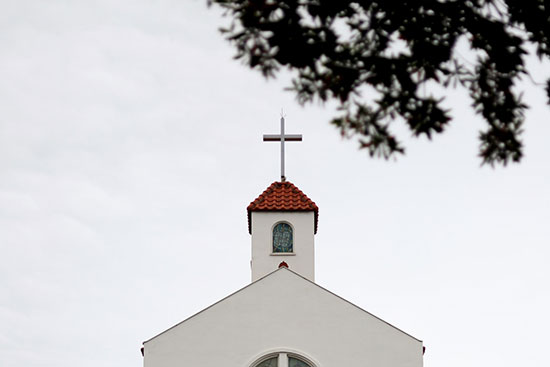Yes, the Seventh-day Adventist Church is a Protestant Christian denomination formed in 1863. Just like other Christians, we believe that Jesus Christ is our Savior and seek to follow the principles of the Word of God.
We have many similar beliefs to other Christian churches, but we also have some that make us unique. Find out what those are as we touch on:
- What it means to be a Christian
- Adventist beliefs that make us Christians
- How Adventists differ from other Christian denominations
- Do Adventists believe we’re the only Christians?
First, let’s define a Christian.
What it means to be a Christian

Photo by Lina Volkmann on Unsplash
A Christian is a follower of Jesus Christ—someone who believes in Him and has accepted Him as their personal Savior.
Many verses in the Bible point towards the simplicity of becoming a Christian. One verse in the New Testament says,
“If you confess with your mouth the Lord Jesus and believe in your heart that God has raised Him from the dead, you will be saved” (Romans 10:9, NKJV).
Becoming a Christian is a personal decision each person makes for themselves. Church membership can’t make you a Christian, and neither can attending services of a specific denomination.
As Christians, we have a few key characteristics. We naturally want to become more like Jesus and learn about Him. This desire leads us to read and study the Bible, pray, fellowship with God’s people through church or other functions, and serve others—all of which help us express our belief in Jesus and learn more about Him.
A crucial aspect is our love for one another. If we love Jesus and believe in Him, as Romans 10:9 says above, our natural response will be to put that love into action.
Now, let’s look at how Adventist beliefs line up with core Christian values.
Adventist beliefs that make us Christians
At the core, Adventists hold many of the same beliefs other Christians do, such as the importance of the Bible to the Christian journey and salvation through faith in Jesus. All of our main teachings are embodied in our 28 Fundamental Beliefs, which are biblical beliefs officially held by the Church.
Here are some key ones:
The Bible
We believe in sola scriptura—that the Bible and the Bible alone is the ultimate authority for Christian faith and practice. We emphasize the authority of the Bible in our 28 Fundamental Beliefs:
“The Holy Scriptures are the supreme, authoritative, and the infallible revelation of [God’s] will. They are the standard of character, the test of experience, the definitive revealer of doctrines, and the trustworthy record of God’s acts in history.”
Jesus Christ
Like all Christians, we believe in Jesus. He alone makes it possible for us to receive salvation. He is our friend, our redeemer, and our creator. Here’s a tidbit from the official belief:
“Forever truly God, He became also truly human, Jesus the Christ. He was conceived of the Holy Spirit and born of the virgin Mary. He lived and experienced temptation as a human being, but perfectly exemplified the righteousness and love of God.1
By His miracles He manifested God’s power and was attested as God’s promised Messiah. He suffered and died voluntarily on the cross for our sins and in our place, was raised from the dead, and ascended to heaven to minister in the heavenly sanctuary on our behalf.”
“He will come again in glory for the final deliverance of His people and the restoration of all things.”
We also believe in both the divinity and humanity of Jesus, the Son of God. Another one of our fundamental beliefs states:
“God the eternal Son became incarnate in Jesus Christ. Through Him all things were created, the character of God is revealed, the salvation of humanity is accomplished, and the world is judged.”2
Other beliefs
Here are more Adventist beliefs that closely mirror those of other Christians:
- The Father. God is our creator, and He is just, merciful, loving, gracious, holy, and slow to anger.
- The Holy Spirit. He is as much a part of God as Jesus is, inspiring the writers of the Bible and guiding us and the church. He filled Jesus’ life with power and draws humans to God’s truths in the Bible.
- The Trinity. God the Father, Jesus, and the Holy Spirit are all equally one as God.
- Jesus’ life, death, and resurrection. Jesus came to earth to minister to us and die on the cross, providing a way to be saved from sin. He overcame the power of death and was resurrected from the grave to return to heaven, where He intercedes for us before God’s throne.
- The experience of salvation. Jesus, though He never sinned, became sin and took the penalty of sin for us so every human being would have the opportunity to receive eternal life with Him. When we turn and follow Him, the Holy Spirit changes us to want to love and serve Him.
- Growing in Christ. Growing in Christ is a daily experience. We grow in Him through reading His Word, spending time with Him in prayer, worshiping Him, and more.
- Unity in the body of Christ. The church is a diverse group of people who come together with their desire to follow Jesus and use their spiritual gifts to serve one another.
- Spiritual gifts and ministries. The Holy Spirit gives every believer different talents and gifts that they can use to support the church and share the gospel.
- The Lord’s Supper. This ceremony, also called Communion, represents what Jesus did for us on the cross. It follows the example of Jesus at the last supper with His disciples before His death.
- Christian behavior. God calls us to think, act, and speak in a way that is harmonious with Him and His Word. This includes how we take care of our bodies, what we watch, what we listen to, how we dress, and how we interact with others.
How Adventists differ from other Christian denominations

Photo by Dr Josiah Sarpong on Unsplash
Seventh-day Adventism has a few beliefs that are different from those of most other Christian denominations. These include our day of worship, the state of humans at death, the heavenly sanctuary, and the gift of prophecy.
And this shouldn’t come as a surprise. After all, other denominations, such as Baptists or Presbyterians, have different beliefs on topics like baptism or predestination. Yet, they are both Christian.
Take a look at this quick overview of unique Adventist beliefs:
- The Sabbath. Adventists keep the biblical Sabbath on the seventh day of the week (Saturday) because God set it apart at Creation (Genesis 2:2–3) and reminded His people of it in the Ten Commandments (Exodus 20:8–11). We see it as a special day of rest and time of worship and connection with God.
- Death. We believe that when a person dies, they rest in the grave rather than immediately going to heaven or hell (Ecclesiastes 9:5–6). At the Second Coming, Jesus will resurrect His followers to eternal life.
- The heavenly sanctuary. The sanctuary described in the Old Testament is a model of the sanctuary in heaven (Hebrews 8:1–2; 9). There, Jesus ministers on our behalf as our high priest, doing a work of investigative judgment.
- The Great Controversy. Lucifer’s rebellion in heaven began a conflict between good and evil that we call the Great Controversy (Revelation 12:7–9). This invisible, ongoing war is happening all throughout the world and is the reason for evil and suffering. Soon, Jesus will end the controversy, forever defeating Satan and sin (Revelation 21:1–5).
- The gift of prophecy. Adventists believe the biblical gift of prophecy is just as relevant today as it was in Bible times (Ephesians 4:11–13). It’s a gift that harmonizes with the Bible rather than replacing it. We believe a woman named Ellen G. White, who lived in the 19th century, was given this amazing gift.
- The Second Coming. “Advent” means “coming” or “arrival,” and Adventists fervently believe we are living in the last days before the second coming of Christ. This event will be literal, visible, personal, and worldwide, and God’s followers, both dead and living, will go to heaven at that time.
- The remnant church. The Bible speaks of a group of people who keep the commandments of God and have the faith of Jesus (Revelation 12:17). They will herald the Second Coming and endure through the last days.
Check out our article that goes into more depth on what makes Adventists unique.

Photo by Helena Lopes on Unsplash
Do Adventists believe we’re the only Christians?
By no means! While Adventist doctrine has some unique elements, we do not believe we are the only true Christians, nor do we believe we will be the only Christians in heaven.
Jesus said that everyone who believes in Him will be saved (John 3:16). He didn’t mention a specific denomination or group of people. Everyone, whether they’re Adventist, Methodist, Baptist, Catholic, or something else, will be saved if they truly believe in Jesus and seek to follow His lead.
And that is the essence of Christianity.
Find a Church
If you’re interested in finding a local Adventist church near you, you can use the Adventist Locator provided by the General Conference of Seventh-day Adventists.
Related Articles
- 28 Fundamental Beliefs. 2020th ed. General Conference of Seventh-day Adventists, p. 3.[↵]
- Ibid. [↵]
More Answers
Everything You Need to Know About an Adventist Church Potluck
Every so often, usually on a schedule ranging from once a week to once a month to once a quarter, an Adventist church will have “fellowship dinners,” often casually referred to as potlucks.
The Seventh-day Adventist Hymnal
The Seventh-day Adventist Hymnal is a songbook used worldwide by many Adventist congregations during their worship services. Since its publication in 1985, it has helped foster praise to God while reminding church members of our mission and drawing them closer to Jesus.
What Are Seventh-Day Adventist Sermons Like?
In nearly every Seventh-day Adventist Church, the sermon is the focal point of the main service—similar to many Protestant Christian denominations. It is a time of biblical instruction by the pastor, who shares what they’ve been studying in the Bible and preparing over the previous week.
Who Are Adventists
The Seventh-day Adventist Church—“Adventists” for short—is a Christian denomination of ordinary people who seek to follow Jesus and live out His mission in this world. Established in 1863, we hold to the Protestant principle of sola scriptura, which means the Bible guides everything we do.
Why is the Great Controversy in my mailbox?
Every year, households across North America receive free copies of a 150-year-old book, The Great Controversy. Millions more are shared around the world.
How do Adventists choose what to eat?
Food blogs overwhelm the internet; food fads are all the rage; and copycat and healthy versions of food are the subject of many a get-together.
Didn’t find your answer? Ask us!
We understand your concern of having questions but not knowing who to ask—we’ve felt it ourselves. When you’re ready to learn more about Adventists, send us a question! We know a thing or two about Adventists.









